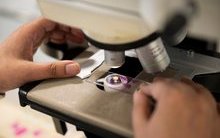The Hutton Review of Forensic Pathology in England and Wales (published November 16) has found that the coronial post-mortem service is in “considerable difficulty”, a view backed by findings of The Royal College of Pathologists.
A recent survey by the College found that a quarter of histopathologists who undertake coroner’s post-mortems intend to give them up in the near future. It also found that over half of hospital departments and public mortuaries struggle to provide a post-mortem service.
Dr Suzy Lishman, President, The Royal College of Pathologists, said:
'We welcome the publication of Peter Hutton’s Review and support its conclusions. It is positive news that the review found that forensic pathology services are of a high standard, but it has also found significant problems within the coronial post-mortem service and acknowledges that both forensic and coronial post-mortem services need urgent attention. This review comes at a critical time for both services which, we agree, are intricately linked and in need of attention to future-proof their delivery. The review proposes the formation of a national death investigation service under the oversight of medical examiners. This is a positive recommendation and a welcome endorsement of the College’s repeated attempts to achieve the introduction of Medical Examiners as legislated for in the Coroners and Justice Act 2009'.The accurate investigation and certification of death underpins the delivery of health services for the living and needs a collaborative approach from the NHS, Ministry of Justice and Department of Health.
The College endorses the recommendations in the review. Specifically:
- Forensic histopathology training must be matched to employment opportunities for trainees exiting the programme
- The contractual arrangements for the delivery of forensic post-mortem services should be reviewed
- The current remuneration structure for coronial post-mortem practice is unsustainable in terms of maintaining the necessary level of service
- The independence of forensic and coronial post-mortem pathologists must be maintained and preferably enhanced; centralising funding for these services within a Special Health Authority is one possible means of achieving this
- The proposed reduction in the number of mortuaries and the regionalisation of services is supported and is in line with similar changes in other areas of pathology practice.
In June 2015 The Royal College of Pathologists conducted a survey of consultant histopathologists and senior trainees. It found that some of the factors affecting the coronial post-mortem service include:
- A shortage of histopathologists available and willing to undertake coronial post-mortems
- Workload pressures – histopathologists who undertake coronial post-mortems also have pressing NHS service commitments
- The fee structure - the current fee of £96.80 is not seen as being commensurate with the skill, complexity and time taken to carry out a post-mortem to a high standard.
Other findings of the survey include:
- 90% of pathologists who don’t undertake coronial post-mortems have done so at some time in the past, but have subsequently given up. 50% gave up due to NHS workload pressure and 24% due to inadequate remuneration
- 76% would not consider re-starting post-mortem work under any circumstances.
It is the College’s opinion that either the coronial post-mortem fee needs to increase significantly to reflect the complexity of the work involved, or the post-mortem service should be incorporated into the NHS and the work included in pathologists’ job plans and recognised as core NHS business.
Notes for editors
- In 2013, approximately 230,000 (45%) of all registered deaths in England and Wales were reported to a coroner. Over 94,000 of these (41%) underwent a coroner’s post-mortem, with around 30,000 (13%) resulting in a coroner’s inquest.
- The coronial post-mortem service in England and Wales is provided in hospital or public mortuaries, usually by histopathologists primarily employed by the NHS, but who answer to the coroner in these cases.
- The role of medical examiners will be to review all deaths. They would also discuss the death with a relative to offer an opportunity for them to ask questions about the medical circumstances and cause of a death and to raise any concerns they might have. This could result in the death being referred to the coroner or to local clinical governance leads. They also would improve the quality of death certification by providing expert advice to doctors. Six successful pilot schemes have been conducted by the Department of Health. The College is the lead medical royal college for medical examiners.
- The Royal College of Pathologists is a professional membership organisation committed to setting and maintaining professional standards and to promoting excellence in the practice of pathology. As well as medically qualified members, the College has scientists amongst its membership and represents 19 pathology specialties. It has over 10,000 members who are senior staff in hospital laboratories, universities and industry worldwide.
- The College is a registered charity and is not a Trade Union. It does not negotiate the terms of employment of its members.







